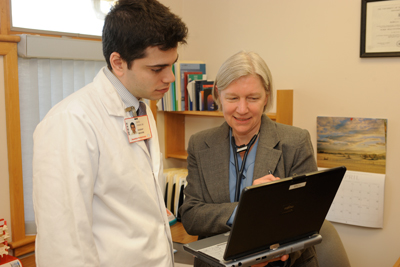Weill Cornell medical students see primary care, rural medicine in Ithaca
By Anne Ju

During their hospital rotations, students at Weill Cornell Medical College in Manhattan see their fair share of patients with serious medical concerns -- the types of things that land people in hospitals. What they don't see as much are the mundane conditions that bring people to doctors' offices or student health centers, ranging from pinkeye to the common cold.
An ongoing collaboration between Weill Cornell, Cayuga Medical Center (CMC) and about a dozen Ithaca doctors, however, gives third- or fourth-year medical students the opportunity to spend a six-week primary care clerkship -- a required part of medical training -- in Ithaca.
The partnership, now in its third year, was hatched by Dr. Adam Law, a local family doctor, endocrinologist and president of CMC's medical staff during 2009. That year he noticed that CMC letterhead claimed an affiliation with Weill Cornell. Law decided to take a loose affiliation and "turn it into something real."
Meetings with the medical school's Office of Affiliations and with Dr. Andrew Schafer, director of Weill Cornell's Department of Medicine, netted the first group of three medical students who, in September 2009, spent their six-week primary care rotation shadowing doctors in Ithaca.
"In Ithaca we have richly different types of practice styles," Law said. "We have family medicine here, which they don't have at Weill, and we have outstanding family practitioners."
The clerkship's first two weeks in Ithaca take place at Gannett Health Services, where students get the rare chance to observe how a university health center serves students.
David Slottje, a third-year medical student, just finished his rotation at Gannett, where he learned, for example, how mononucleosis, a common concern on college campuses, is managed.
He also spent time at Law's office learning how primary care and endocrinology work in a community -- a valuable experience, given that most doctors end up working in such settings, rather than in hospitals.
"It gives us an opportunity to see things we wouldn't see otherwise," Slottje said. "Either to see serious disease being managed over time, or to see less serious diseases that would never show up in the hospital."
Schafer said that the students' experiences with Ithaca doctors also gives them an opportunity to observe the practice of rural medicine, an important dimension to medical training that is unavailable in Manhattan.
"In some cases, students have reported that their experiences have been nothing less than transformative in choosing careers," Schafer said.
Before the Ithaca clerkships, medical students were a rare sight in Ithaca. Now they have a year-round presence at Cayuga Medical Center and Ithaca. In fact, Weill Cornell officials are exploring how CMC can launch its own small-scale accredited residency program in internal medicine, which they anticipate will be linked to the Weill Cornell residency, according to Schafer.
Beyond the clerkship, Law sees further benefits of bringing local doctors and Weill Cornell clinicians closer together. Doctors in Ithaca can apply for clinical faculty positions at Weill Cornell and participate in activities at the medical school. In turn, Ithaca doctors can solicit consultation or collaboration with Weill Cornell doctors in their everyday practices.
"There is immediate collegiality to be gained," Law said. "On the level of clinical practice, there is a benefit to creating this three-institution collaboration."
Media Contact
Get Cornell news delivered right to your inbox.
Subscribe